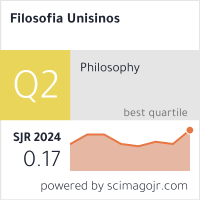Our deontological-utilitarian (deontoutilitarian) minds
DOI:
https://doi.org/10.4013/fsu.2013.142.03Resumen
In this article I discuss the standard responses given by people for moral dilemmas related to life and death, proposing a philosophical model that I call “the utilitarian-deontological (deontoutilitarian) model ” to explain how the majority of people respond to these dilemmas. I suggest that when people make moral judgements they use a system of judgments that combines utilitarian and deontological considerations, a system that is primarily deontological, and accept that to kill innocent people is wrong. Faced, however, with the necessity of having to kill someone to save more people, they will typically say that it is right to do this, unless they have to use their own personal force or have to have some kind of personal contact with the person(s) to be sacrificed. In these cases they will refrain from carrying out the act. However, typically they will agree that it is right to kill the person even using their personal force or having some kind of contact with the person if death is inevitable or in catastrophic situations, in which unless you kill one person hundreds of people will die as a consequence. The majority of us, however, will come back to their deontological judgment again if we are faced for example with a “blackmail” situation, in which someone asks us to carry out a killing and if we refuse they threaten to kill everybody. In this situation people are outraged with the offer and will typically judge the situation in a deontological way again, saying that it is wrong to carry out the killing.
Key words: trolley problems, moral dilemmas, deontoutilitarianism, utilitariandeontological model.
Descargas
Descargas
Publicado
Cómo citar
Número
Sección
Licencia
Concedo a revista Filosofia Unisinos – Unisinos Journal of Philosophy o direito de primeira publicação da versão revisada do meu artigo, licenciado sob a Licença Creative Commons Attribution 4.0 (que permite o compartilhamento do trabalho com reconhecimento da autoria e publicação inicial nesta revista).
Afirmo ainda que meu artigo não está sendo submetido a outra publicação e não foi publicado na íntegra em outro periódico e assumo total responsabilidade por sua originalidade, podendo incidir sobre mim eventuais encargos decorrentes de reivindicação, por parte de terceiros, em relação à autoria do mesmo.










